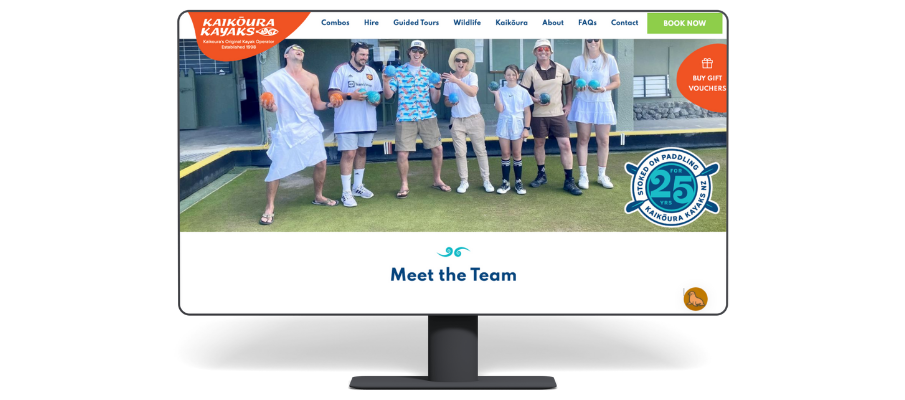10 SEO Hidden Secrets You Probably Haven't Thought Of
By Tomahawk on

Everyone knows the basics of SEO: use keywords, write great content, get backlinks, keep your site speedy. But what about the less obvious stuff? Those subtle signals that can give your website a quiet nudge up the rankings while your competitors are still obsessing over meta tags and blog lengths?
Here’s a look at a few clever, lesser-known SEO 'hidden secrets' you might not have thought of, the kind that layer nicely on top of your existing efforts and can make a real difference to your digital visibility.
1. Reply to Google Reviews with Purpose
One of our clients recently asked if adding keywords into their Google review replies helps with SEO, and the short answer is yes, a little!
While Google doesn’t directly score the text in replies the way it does for your website content, those keywords can help reinforce context about your business. Think of it as subtle reinforcement: when Google sees your business name associated repeatedly with “guided hiking tours in Queenstown” or “luxury lodge in Rotorua,” it strengthens the connection between your brand and those search phrases.
Just don’t overdo it. Write naturally, thank the reviewer, and mention the relevant service or location only where it fits naturally. For example:
“Thanks so much for joining our sunset sailing tour in the Bay of Islands, we’re thrilled you enjoyed the dolphins!”
That’s genuine and gives the algorithm a little SEO juice.
2. Refresh Your Old Blog Posts
Google loves fresh content, but that doesn’t mean you need to keep reinventing the wheel. Instead, update your existing high-performing blogs every 6–12 months (and update the publish date...see more about dates below in #9!).
Add new stats, update any seasonal references, or tweak the intro to reflect current trends (“in 2025, AI search is changing how travellers plan their trips…”).
You’ll signal to Google that your content is current and maintained, which can lift it in rankings without needing a brand-new post. This trick works particularly well for evergreen tourism topics like “best time to visit” or “top things to do in…”

3. Optimising Your Image Filenames (Not Just Alt Text)
Alt text gets a lot of love, and yes, it’s important for accessibility and SEO. But another useful tip is to optimise your image filenames.Before uploading photos to your website, rename them descriptively. Instead of IMG_3421.jpg, try kayaking-milford-sound.jpg.
Google indexes image filenames, and when travellers use image search or visual discovery tools, that context helps your site appear more often.
BONUS TIP: compress and resize images for faster load speeds, every second counts for SEO performance.
4. Linking Between Your Blogs
Internal linking is often overlooked, but it’s one of the most powerful ways to help Google understand your site’s structure.
The key is don’t just link for the sake of it, be strategic. Use natural, descriptive anchor text that tells Google (and readers) exactly what they’ll find. For instance:
“If you’re planning your South Island road trip, you might also like our guide to hidden gems in Otago.”
This builds strong content relationships and keeps readers on your site longer, two things the algorithm loves.
5. “Localising” Your Content More Deeply
Most tourism businesses already use local keywords like “Rotorua accommodation” or “Abel Tasman kayaking.”
But what about weaving in hyperlocal or cultural context?
Include local terms, landmarks, or even regional events in your content. For example:
- “Best coffee spots near Te Puia”
- “Where to see glow worms in Waitomo this winter”
- “Planning a weekend at the Mangawhai Food & Wine Festival?”
These deeper signals tell Google your business is rooted in place, and that matters hugely for local search visibility, especially on Maps.

6. Use Schema Markup (a.k.a. The Secret Code of SEO)
This one’s not glamorous, but it’s incredibly effective. Schema markup is a behind the scenes bit of code that helps Google better understand what’s on your page, whether it’s an event, a review, or an accommodation listing.
For tourism businesses, schema can help:
- Display star ratings in search results
- Show tour dates or pricing directly in search
- Improve your chances of appearing in featured snippets or “Things to Do” carousels
If you’re not already using schema, this is one area to level up your technical SEO and our team of SEO experts can help!
7. Embedding Keywords in Media
Google’s AI-powered search tools are getting better at reading and analysing images, captions, video titles, and even transcripts.
If you upload video content to your site or YouTube channel, make sure you use descriptive titles and captions like:
“Snorkelling with whales in Tonga, eco-friendly marine tours”
This reinforces topical relevance and connects your multimedia to your broader SEO strategy.
8. Making Your “About” Page Work Harder
Most “About Us” pages get neglected, but they’re often one of the most visited and most trusted pages on a site.
Use it to build your E-E-A-T (Experience, Expertise, Authoritativeness, Trustworthiness) signals by:
- Sharing the real people behind the business (with names and roles)
- Mentioning your location and years of experience
- Linking to media coverage or industry awards
- Including clear contact info and social links
This not only builds customer trust, it also boosts your credibility in Google’s eyes.

9. Leverage “Last Updated” Dates
Here’s a great one: displaying a “last updated” date (instead of just “published”) on your blog posts.
Google and readers alike use these as freshness cues. If your content looks current, it’s more likely to be clicked, and higher click-through rates reinforce your relevance in search.
10. Use AI Tools for SEO Insights
AI tools like Perplexity, ChatGPT, and Gemini aren’t just for writing. Use them to:
- Spot content gaps your competitors haven’t filled
- Generate related keywords and search questions
- Analyse your tone or readability against Google’s standards
- Summarise long analytics data into key insights
With SEO Every Little Bit Helps
SEO in isn’t just about keywords and backlinks, it’s about every small, smart action that makes your business more visible, relevant, and helpful to real people.
Every little SEO task you achieve combines to build a strong SEO strategy. From the way you reply to reviews, to how you name your images and connect your stories, these under the radar tweaks can quietly lift your search performance and help your brand stand out.
If you’d like a quick SEO Health Check for your tourism business, our team at Tomahawk can help you identify ways to boost your SEO and which of these overlooked tricks will make the biggest difference for your website.
Read more articles
Why North America is Your New Best Friend (and how to catch the wave)
By Renee Goodsell |

Our General Manager, Renee headed along to the inaugural SKAL International Auckland event to catch an update from Mick Cottrell on all things Auckland Airport. There was one stat that surprised her, and the team.
North America...
What Do Wikipedia and Reddit Have in Common?
By Tomahawk |

They’re probably not in your 2026 marketing plan. But they should be.
While most tourism businesses focus on websites, SEO, social and paid ads, two of the most influential platforms shaping AI-generated answers are Wikipedia and...
